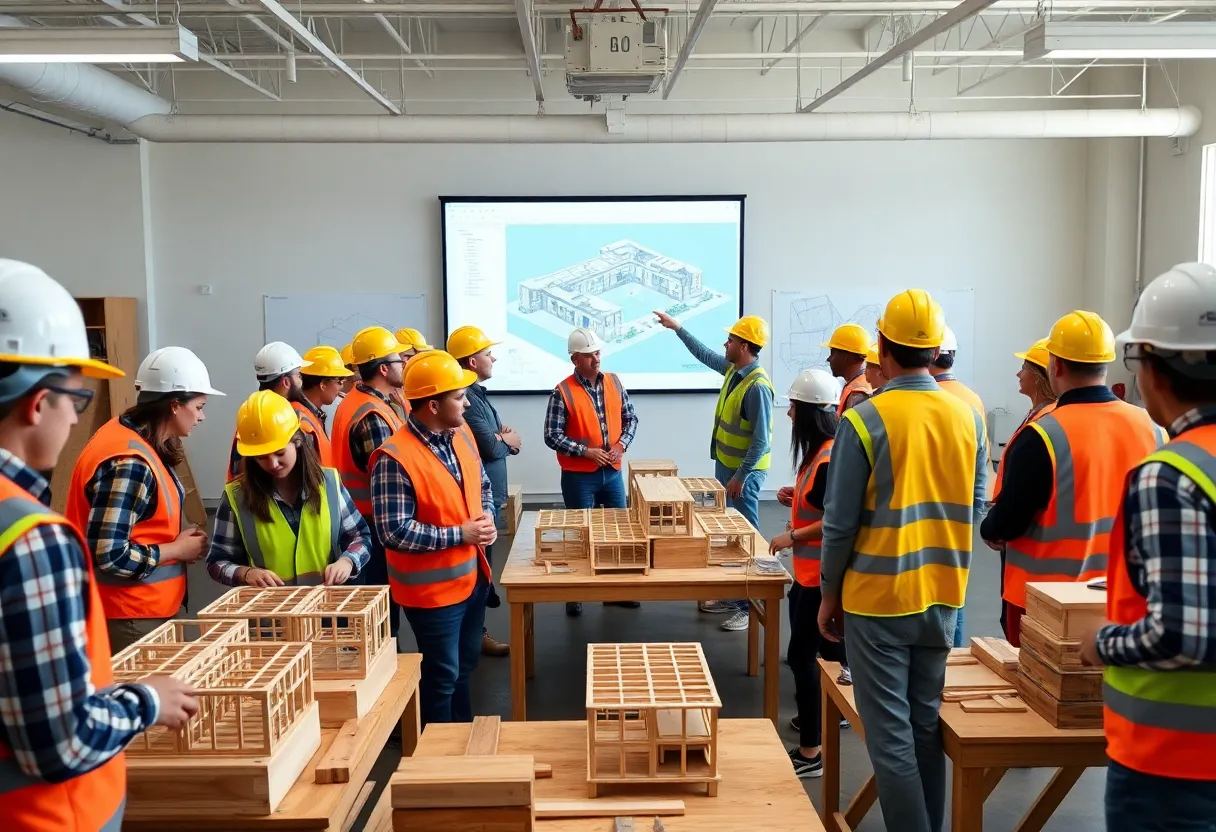Carolinas, August 13, 2025
News Summary
The Carolinas Associated General Contractors (CAGC) has committed $5.5 million across a Construction Bootcamp and a Construction Business Academy to boost workforce capacity and small-business growth. The bootcamp partners with community colleges to accelerate training in trades such as plumbing, electrical and carpentry, producing apprenticeship and internship placements. The business academy has supported 100+ firms—many minority- and women-owned—with free training, planning and capital access, reporting an average 53% revenue lift and $2.15M in new project revenue. A Young Leader Program has trained 335+ professionals in tech, sustainability and digital construction methods to build a scalable talent pipeline.
Carolinas Construction Readies for $1.2T Infrastructure Wave After $5.5M Workforce and Business Investment
Key takeaway: An industry association in the Carolinas has directed $5.5 million into workforce and small-business programs that trained more than 335 young leaders and helped over 100 small firms increase revenue, measures the group and partners point to as positioning the region to capture national infrastructure spending tied to a $1.2 trillion investment window.
What happened
The Associated General Contractors of the Carolinas (CAGC) deployed a combined $5.5M initiative split between a $2.5M Construction Bootcamp and a $3M Construction Business Academy. These programs focus on training skilled trades, developing business capacity, and advancing youth-driven leadership to tackle workforce shortages and improve project delivery.
Immediate results
- Young Leader Program: More than 335 participants under age 45 trained in technology, sustainability and workforce innovation. The program includes discounted access to major industry events and mentorship from experienced practitioners.
- Construction Bootcamp: Funded by a state grant of $2.5M, the bootcamp partners with North Carolina community colleges to accelerate training in plumbing, electrical work and carpentry. The first cohort produced graduates who secured apprenticeships and internships.
- Construction Business Academy: Backed by a $3M initiative, the academy delivers free business training, strategic planning support and access to capital for minority, women and disadvantaged business owners. More than 100 small businesses have taken part and report an average revenue increase of 53%, generating $2.15M in new project revenue.
Why it matters now
The timing aligns with national infrastructure priorities and macroeconomic signals. The federal Infrastructure Investment and Jobs Act allocates roughly $1.2 trillion for infrastructure over eight years, creating a large pipeline of projects. Meanwhile, the S&P Construction Index has shown consistent gains over five years, reflecting steady demand across infrastructure, residential and commercial work. Together, these forces create opportunities for regions that can deliver skilled labor and efficient project execution.
How the programs change outcomes
CAGC frames the programs as part of a broader shift toward innovation-led, human-capital-driven project delivery. Trained participants are adopting lean methods and digital tools such as Building Information Modeling (BIM), and are likely to integrate AI-driven project management and modular construction. The association argues these shifts reduce project delays, cut cost overruns and lower risks for investors while improving operational margins for firms that adopt them.
Who benefits and how
Workers benefit through fast-tracked trade training, apprenticeships and mentorship. Small businesses, particularly minority-, women- and disadvantaged-owned firms, gain business skills, strategic planning and better access to capital. Investors and public owners benefit from a deeper labor pool and firms that are better equipped to manage technology, sustainability standards and changing workforce dynamics.
Evidence of scalability
The bootcamp’s apprenticeship and internship placements, combined with the Business Academy’s revenue gains and new-project wins, are presented as measurable outcomes that validate the programs as scalable templates. Program participants frequently leverage networks and training to grow operations and bid on larger projects, translating training into real market outcomes.
Strategic context
Beyond immediate training outcomes, the programs place explicit emphasis on ESG-aligned initiatives, sustainability skills and inclusive ownership models. The stated logic is that diversity in ownership expands market reach and resilience, while leadership focused on innovation enables firms to capture higher margins and reduce investor risk. The combined effect is portrayed as a regional blueprint for sustainable growth in a new infrastructure era.
Implications for investors and stakeholders
For investors looking for long-term exposure to construction-related returns, the Carolinas’ approach offers two linked advantages: (1) developing human capital to minimize schedule and budget risk, and (2) promoting early adoption of technology and process innovation to improve margins. The programs’ early data — workforce placements, revenue growth and new project wins — are positioned as indicators of durable, investible capacity in the region.
Next steps and timing
Organizers and regional partners emphasize that timing matters: the coming years of federal infrastructure spending will favor regions that can quickly field skilled crews, digitally capable firms and resilient small-business ecosystems. The programs aim to create a pipeline of professionals and companies able to compete for that work.
Bottom line
By investing $5.5M across workforce and business programs, the region is building a practical, scalable model focused on youth leadership, inclusive business growth and technology adoption. Early results — hundreds of trained young leaders, apprenticeship placements and measurable revenue gains for small firms — offer a pathway for the Carolinas to capture a meaningful share of near-term infrastructure investment and to reduce common execution risks on large projects.
FAQ
What programs were funded and how much was invested?
The combined investment totaled $5.5M, split between a $2.5M Construction Bootcamp and a $3M Construction Business Academy.
How many young professionals were trained?
More than 335 young leaders under age 45 participated in the Young Leader Program focused on technology, sustainability and workforce innovation.
What outcomes have already been reported?
Bootcamp graduates secured apprenticeships and internships. Over 100 small businesses in the Business Academy reported an average revenue increase of 53% and generated $2.15M in new project revenue.
How do these programs affect investors?
The programs are intended to reduce project delays and cost overruns through better-trained crews and innovative firms, lowering project risk and improving operational margins — factors that can be attractive to investors.
Are these programs connected to federal infrastructure funding?
Yes. The initiatives align with the national Infrastructure Investment and Jobs Act, which allocates about $1.2 trillion over eight years for infrastructure-related work.
Who is eligible to benefit from the Business Academy?
The Business Academy targets minority, women and disadvantaged business owners, offering free training, strategic planning and help accessing capital.
Key Features at a Glance
| Program | Funding | Target | Main Outcomes | Notes |
|---|---|---|---|---|
| Construction Bootcamp | $2.5M state grant | New trade workers / community college students | Apprenticeships & internships from first cohort | Partners with North Carolina community colleges; focus plumbing, electrical, carpentry |
| Construction Business Academy | $3M | Minority, women, disadvantaged business owners | 100+ firms helped; average revenue growth 53%; $2.15M new project revenue | Free business training, strategic planning, access to capital |
| Young Leader Program | Program support (part of $5.5M initiatives) | Professionals under 45 | 335+ trained in tech, sustainability, workforce innovation | Mentorship, discounted event access, BIM and lean adoption emphasis |
Deeper Dive: News & Info About This Topic
Additional Resources
- AInvest: Emerging Leadership in the Construction Sector — Carolinas
- Wikipedia: Construction industry in the United States
- The Malaysian Reserve: Carolinas AGC responds to national workforce shortage
- Google Search: Carolinas AGC Construction Bootcamp Business Academy
- Associated General Contractors (AGC) of America
- Google Scholar: construction workforce development apprenticeship
- North Carolina Community College System
- Encyclopedia Britannica: Apprenticeship (search)
- Construction Dive (industry news)
- Google News: Infrastructure Investment and Jobs Act Carolinas
Author: Construction NY News
The NEW YORK STAFF WRITER represents the experienced team at constructionnynews.com, your go-to source for actionable local news and information in New York and beyond. Specializing in "news you can use," we cover essential topics like product reviews for personal and business needs, local business directories, politics, real estate trends, neighborhood insights, and state news affecting the area—with deep expertise drawn from years of dedicated reporting and strong community input, including local press releases and business updates. We deliver top reporting on high-value events such as the New York Build Expo, infrastructure breakthroughs, and cutting-edge construction technology showcases. Our coverage extends to key organizations like the Associated General Contractors of New York State and the Building Trades Employers' Association, plus leading businesses in construction and real estate that power the local economy such as Turner Construction Company and CMiC Global. As part of the broader network, including constructioncanews.com, constructiontxnews.com, and constructionflnews.com, we provide comprehensive, credible insights into the dynamic construction landscape across multiple states.





